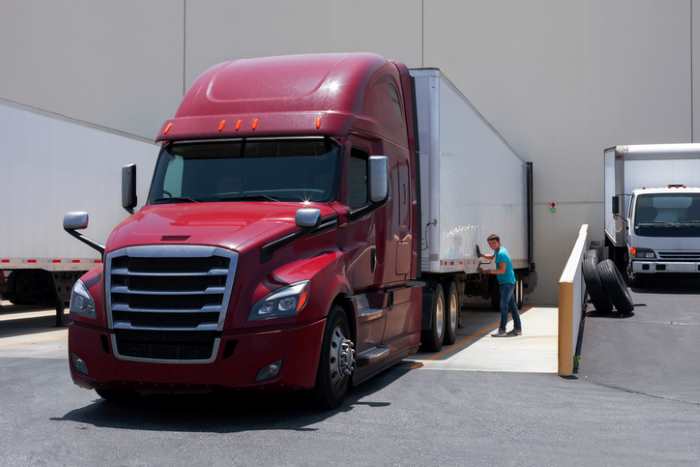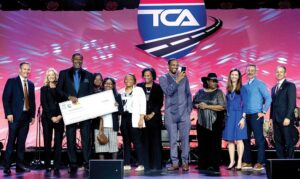NEW YORK — The Biden administration enacted a new labor rule Jan. 9 that aims to prevent the misclassification of workers as “independent contractors,” a step that could bolster both legal protections and compensation for millions in the U.S. workforce.
Business groups, including those in the trucking industry, warned the rule creates uncertainty for employers and much depends on how the Labor Department decides to enforce it.
The Labor Department rule, which the administration proposed 15 months ago, replaces a Trump-era standard that narrowed the criteria for classifying employees as contractors. Such workers are not guaranteed minimum wages or benefits, such as health coverage and paid sick days.
“Truckers are tired of the endless parade of classification rules that do not listen to their concerns,” said Todd Spencer, president and CEO of the Owner-Operator Independent Drivers Association (OOIDA). “This constantly changing landscape has created uncertainty that makes it more difficult for them to operate their businesses. We are still reviewing all the details in the final rule, and it is too soon to know what the exact effect of this final rule would be.”
Spencer said that OOIDA has had concerns since the Biden administration first issued the proposal.
“We have concerns that some details contained in the rule may disregard specifics of the trucking industry and could lead to the reclassification of independent contractors as employees,” Spencer said. “With that said, we support the Department’s stated intent to follow decades-long practices for classification under the Fair Labor Standards Act, as well as its rejection of the ABC Test as signed into law in California with AB5.”
Spencer continued: “As we have stated before, any classification rule must allow for owner-operator relationships to be examined on a case-by-case basis. This approach has historically allowed owner-operators to work as independent contractors and generally protected workers from misclassification. As we continue to review the final rule and engage with the Department and Congress about this rulemaking, we will fight to protect the rights of small-business truckers, owner-operators, and all of America’s hard-working truckers.”
American Trucking Associations President and CEO Chris Spear said the rule takes way Americans’ freedoms.
“I can think of nothing more un-American than for the government to extinguish the freedom of individuals to choose work arrangements that suit their needs and fulfill their ambitions,” Spear said. “More than 350,000 truckers choose to work as independent contractors because of the economic opportunity it creates and the flexibility it provides, enabling them to run their own business and choose their own hours and routes. That freedom of choice has been an enormous source of empowerment for women, minorities, and immigrants pursuing the American Dream.”
Spear said that the trucking industry has used independent contractors since the inception of interstate trucking, and court decisions over the last 90 years have continually reaffirmed the legitimate role independent contractors play in the economy.
“It’s unfortunate that the administration has chosen to replace a clear and straightforward standard with a tangled mess that weakens our supply chain and undermines the livelihoods of hundreds of thousands of truckers across the country,” Spear said. “The coordinated release of this rule with the renomination of Julie Su to lead the Department of Labor is proof positive that the Administration is doubling down on destructive policies that eliminate choice and opportunity for our workforce. Had Su actually taken the time to talk to independent contractors, she’d know firsthand what a misguided rule this really is. That is exactly why we opposed her nomination before and why we will continue to oppose it now. Radical California agendas have no place in federal policy.”
Spear vowed that the ATA “will work with members of Congress and other stakeholders to defeat this ill-advised rule.”
In a statement, the Intermodal Association of North America (IANA) called the new requirements “burdensome,” adding that they “significantly limit the use of independent contractors in the trucking industry and threaten to force the reclassification of over 80 percent of intermodal drayage drivers that currently enjoy independent contractor status.”
“For decades, the independent contractor business model has been widely favored by intermodal motor carriers and drivers,” said Joni Casey, president and CEO of the IANA. “Although employee-driver positions are readily available, these owner-operator drivers explicitly chose the freedom, flexibility, and independence that comes with small business ownership. By maintaining control over their schedules, opportunities, and business decisions, independent drivers are highly incentivized to provide safe, efficient, and cost-effective services that contribute to our nation’s economic growth.”
Labor advocates have supported the rule, saying employers have exploited lax rules to misclassify workers and avoid properly compensating them. In a report, the left-leaning Economic Policy Institute said construction workers, truck drivers, cleaners, landscapers, security guards and call center workers are among the most commonly misclassified workers. It estimated that misclassified construction workers lose between $10,177 and $16,729 per year.
The rule, while will take effect March 11, directs employers to consider six criteria for determining whether a worker is an employee or a contractor, without predetermining whether one outweighs the other. That’s a change from the Trump-era rule, which prioritized two criteria: how much control a company has over its workers and how much “entrepreneurial opportunity” the work provides.
Advocates say the new rule offers a more comprehensive approach to determining whether workers are truly in business for themselves. In a briefing with reporters Monday evening, Acting Secretary of Labor Julie Su said misclassified workers “sometimes work side by side with individuals who are properly classified, doing the same work.”
“But misclassified employees don’t get paid for all of their hours,” Su said. “They’ve seen their economic security eroded because of misclassification.”
Potentially at issue for ride-hailing, delivery and other apps is a requirement that employers consider whether the jobs performed by workers are an integral part of the company’s business.
Mary Kay Henry, president of the Service Employees International Union, which represents about 2 million workers, said in a statement that the new rule “takes direct aim” at the practices of corporations like Uber and Lyft that have taken “advantage of misclassifying workers to shirk accountability as employers, avoid paying their fair share and game a system already rigged in their favor.”
But it’s up to employers initially to decide how to weigh each criteria, which also include how much control the employer has over the worker, whether the work requires special skills, the degree of permanence of the relationship between worker and employer, and the investment a worker makes, such as car payments.
This rule does not materially change the law under which we operate, and won’t impact the classification of the over one million Americans who turn to Uber to make money flexibly,” Uber’s head of federal affairs, CR Wooters, said in a prepared statement.
Lyft also said the new rule will not force the company to change its business model, while warning that “this new guidance creates additional complexities and ambiguities for companies and courts alike across the country.”
Flex Association, a group that represents major app-based rideshare and delivery platforms, said it will “seek to ensure implementation of this rule does not target workers who overwhelmingly turn to app-based platforms to earn supplemental income on their own terms.”
The new rule comes at a time when more states are passing laws that guarantee a minimum wage and other benefits for app-based workers, including New York last year.
The U.S. Chamber of Commerce is considering challenging the rule in court, said Marc Freedman, the chamber’s vice president of workplace policy.
Freedman said the new guidelines make it difficult for companies to know whether they are giving enough importance to any of the six criteria. He said it will depend on how aggressively the Labor Department decides to implement the rule, but the structure is biased toward classifying workers as employees.
“It leaves employers in the dark about whether they made the right decision,” Freedman said in an interview with The Associated Press. “The only time they can be confident is if they call a worker an employee.”
Jessica Looman, administrator of the Department of Labor’s Wage and Hour Division, said during the briefing that the final rule isn’t intended to apply specifically to certain industries or type of work. Asked about enforcement, Looman said the department will focus on the “most vulnerable workers,” particularly those who are being unfairly deprived of minimum wages and overtime pay.
The rule does not carry the same weight as laws passed by Congress or state legislatures. Instead, it offers an interpretation of who should qualify for protections under the 1938 Fair Labor Standards Act.
The Associated Press contributed to this report.
Born in Pine Bluff, Arkansas, and raised in East Texas, John Worthen returned to his home state to attend college in 1998 and decided to make his life in The Natural State. Worthen is a 20-year veteran of the journalism industry and has covered just about every topic there is. He has a passion for writing and telling stories. He has worked as a beat reporter and bureau chief for a statewide newspaper and as managing editor of a regional newspaper in Arkansas. Additionally, Worthen has been a prolific freelance journalist for two decades, and has been published in several travel magazines and on travel websites.












what the government is saying that the Uber drivers type jobs are considering contractors to be responsible for all their own expenses ,fuel ,gas insurance and federal income taxes ,without having any protections as to hours worked ect which an employee would have. Some workers want it that way especially in trucking as being a lease operator ect may give you more income .Drivers however don’t figure the expenses and taxes and that your percent of loads is never what the load pays but what the company payroll dept. figures the load should pay after they also take their own fees. Many lease ops are barely running at fast food wages , like the company drivers are because you are actually at work 24/7 in the truck.That is the freedom which you are gaining ,or sacrificing because still , unless that load gets there in their time at there rules you may not get paid.
its about these low life crimanls have to stop paying a driver a 1099 when we drive their truck with their fuel card and their insurance. now i am nor a asshole libtart but right is right